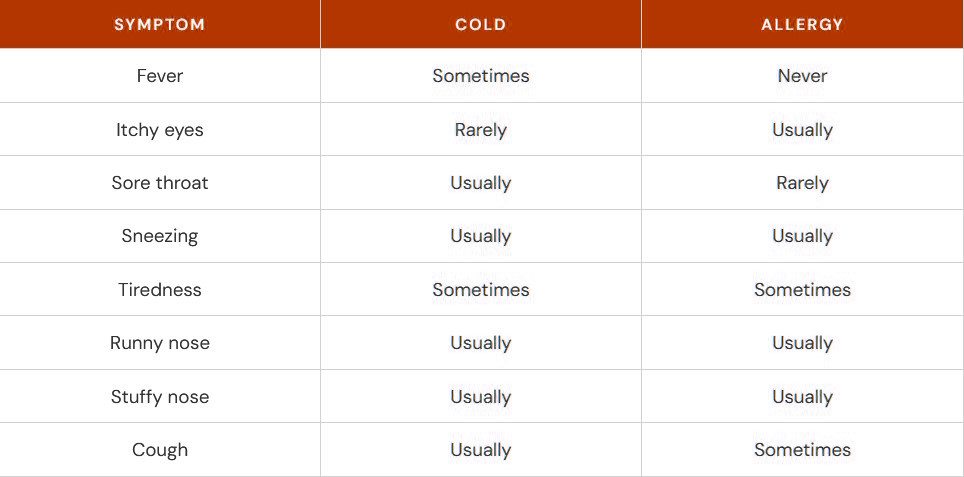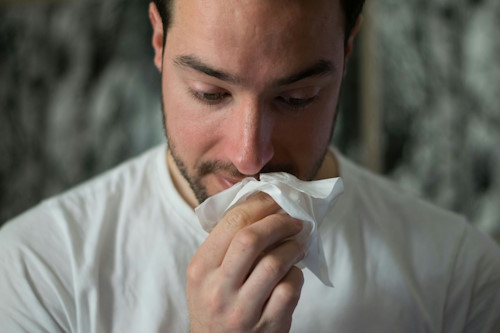When spring or fall is in the air, so is pollen, the powdery plant substance that triggers seasonal allergies for tens of millions of Americans.
But if you’re sneezing and your nose is running it can be difficult to know whether the issue is pollen or something else. Maybe you have a cold.
“Although there is a lot of overlap with symptoms, allergies and colds are very different,” says Joao Pedro Matias Lopes, MD, assistant professor of pediatrics at Case Western Reserve University School of Medicine in Cleveland. “Knowing which you have is important so you can get the right, effective treatment.”
BREAKING: Try a New Fish Oil Supplement Full of Omega 3 Fatty Acids
Allergies vs. Colds: Causes
Seasonal allergies and the common cold stem from different issues.
What Causes Allergies?
An allergy is an overreaction of the body’s immune system to generally harmless foreign substances that enter the body, called allergens. While a person can be allergic to certain foods, insect bites, medications, and other products, seasonal allergies are typically a response to airborne particles — most commonly, pollen produced by trees, grasses, and weeds.
Other common airborne allergens include dust mites, animal dander, and mold spores.
When triggered, the immune system mounts a response against the invader, producing antibodies called immunoglobulin E (IgE). These antibodies cause cells to release histamines and other chemicals that produce allergic reactions.
With seasonal allergies, symptoms like watery eyes help remove pollen and other irritants from the body.
What Causes a Cold?
As with an allergy, a common cold is the immune system’s response to an invader, but in this case, it’s a virus infecting the upper respiratory tract — the nose, throat, sinuses, and windpipe (trachea).
More than 200 viruses can cause the common cold, with rhinoviruses the most frequent culprit.
Symptoms like sneezing aim to rid the body of allergens — in this case, viruses.
Allergies vs. Colds: Symptoms
Mayo Clinic offers a chart that compares cold symptoms and allergy symptoms side-by-side:

Sneezing and Mucus
Although sneezing is common with both a cold or allergies, sneezing due to an allergy is typically more frequent and persistent, according to Stephen Kimura, MD, an allergist in Pensacola, Florida, and a medical reviewer for Everyday Health.
“With allergies you may sneeze five times in a row, versus with a cold, where you’re more likely to have one or two sneezes, blow your nose, and you’re clear,” says Dr. Kimura.
Dr. Lopes adds that if you’re sneezing more outdoors than indoors, that could be a sign you have allergies rather than a cold.
Mucus is another way to distinguish a cold from allergies. Mucus may be clear early during the course of a cold, but it usually becomes thicker and acquires a color as time passes. In contrast, mucus resulting from seasonal allergies stays clear and thin.
Allergies vs. Colds: Duration
A major characteristic separating allergies from colds is how long they typically persist.
“Colds typically resolve [get better] within 7 to 10 days, while allergy symptoms persist as long as the allergen is around,” which could be weeks or even months, says David Erstein, MD, an allergist and division chief of allergy at NYC Health + Hospitals, Lincoln.
Additionally, Dr. Erstein says, “Allergies tend to be seasonal or year-round, whereas colds are more common in the colder months when viral transmission is higher,” as a result of people spending more time together indoors.
Allergies vs. Colds: Prevention
Good hygiene practices help prevent both seasonal allergy attacks and colds, particularly showering for allergies and hand-washing for colds.
“I tell people who are allergic to pollen, if you’ve been outdoors for a while, get inside, get out of those clothes, and get in the shower to get that pollen off of you,” says Kimura.
Unlike colds, allergies are not contagious so people don’t have to worry about infecting others. But since allergic reactions put a strain on the immune system, “I tell people with allergies that they are also a magnet for respiratory infections,” Lopes says. “So you could have both allergies and a cold at the same time.”
How to Prevent Allergy Attacks
Minimize the effects of pollen by following these rules:
- Remove clothes you’ve worn outside and shower.
- Avoid lawn mowing and other outdoor chores that stir up pollen.
- Limit outdoor activity in the mornings, when pollen counts are highest.
- Stay indoors on dry, windy days when more pollen is in the air.
- Stay indoors when pollen counts are high.
- Take allergy medications before symptoms start.
- Use air conditioning and consider getting a high-efficiency particulate air (HEPA) filter.
- Keep windows closed during pollen seasons.
“People with allergies may be tempted to crack a window at night when it’s cool,” says Kimura. “I tell them they might as well drag their bed outside and sleep under a tree. If your window is open at all, allergens can get in.”
How to Prevent Colds
To stay virus-free and protect others, aim to:
- Wash hands often.
- Avoid touching eyes, nose, or mouth.
- Cover coughs and sneezes.
- Clean and disinfect frequently touched surfaces.
- Don’t share personal items.
- Avoid being in crowded indoor spaces during the colder months.
- Wear a mask in crowded indoor spaces during the colder months.
Allergies vs. Colds: Treatment
When allergy or cold symptoms are making you miserable, treatments can help. Some decongestants and pain relievers may ease a stuffy nose and aches whether you have allergies or a cold.
A saline nasal spray is an all-purpose remedy. “I find a little squeeze bottle with saline solution can help both colds as well as allergies,” says Kimura. “If you’re infected with a cold virus, it helps rinse out all that mucus and congestion. If the issue is allergies, it helps rinse out allergens you’ve been breathing in throughout the day.”
Allergy Treatment
Drug and nondrug allergy treatments include:
- Antihistamines in pill and spray forms (to block the effects of histamines)
- Nasal steroid sprays
- Nasal rinse (saline solution)
- Allergy shots (allergen immunotherapy), for some people with severe allergies
Treatment for the Common Cold
Ways to manage cold symptoms include:
- Rest and hydration
- Over-the-counter cold medications (decongestants and pain relievers)
- Home remedies (honey, warm teas)
- Nasal rinse (saline solution)
TRENDING: The Fast & Efficient Way To Lose Weight, Just 1 Cup a Day
When to Seek Medical Advice
While most people can handle seasonal allergies and colds on their own, certain red flags indicate the need for medical evaluation.
“If symptoms persist beyond 10 to 14 days, worsen significantly, or do not respond to treatment, it may be time to see a doctor,” says Erstein.
Possible complications warranting a healthcare visit, he says, include:
- Sinus infection, with facial pain and thick nasal discharge
- Asthma exacerbation, with wheezing or shortness of breath
- Ear infection, with ear pain and fluid drainage
If you have chronic allergies, asthma, or recurrent sinus infections, a healthcare provider can help identify triggers, prescribe stronger treatments like allergy immunotherapy (allergy shots), and monitor for complications.
The Takeaway
- Colds and seasonal allergies share symptoms such as runny nose, sneezing, and congestion.
- If you have a sore throat or a cough, the issue is probably a cold rather than allergies.
- If you have itchy eyes, the cause is probably allergies rather than a cold.
- Decongestants and saline nasal sprays can help whether you are experiencing seasonal allergies or a cold.








